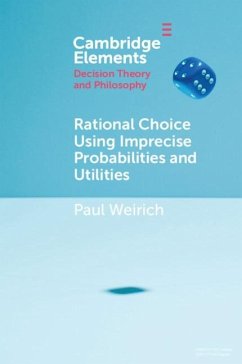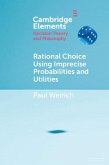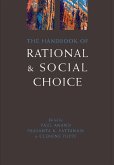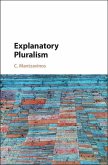An agent often does not have precise probabilities or utilities to guide resolution of a decision problem. I advance a principle of rationality for making decisions in such cases. To begin, I represent the doxastic and conative state of an agent with a set of pairs of a probability assignment and a utility assignment. Then I support a decision principle that allows any act that maximizes expected utility according to some pair of assignments in the set. Assuming that computation of an option's expected utility uses comprehensive possible outcomes that include the option's risk, no consideration supports a stricter requirement.
Dieser Download kann aus rechtlichen Gründen nur mit Rechnungsadresse in A, B, BG, CY, CZ, D, DK, EW, E, FIN, F, GR, HR, H, IRL, I, LT, L, LR, M, NL, PL, P, R, S, SLO, SK ausgeliefert werden.









